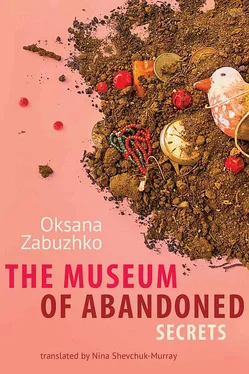What is it you imagine you want, kid? And who the hell are you anyway, for me to be “looking for” you?
“I was told you’re looking to make a film about Olena Dovganivna.”
Aha.
“And you care because?”
“That was my granny. My great-aunt, actually,” you added with a quick apologetic smile.
He does have a sweet smile, I thought then; it lights his face like the sun breaking through the clouds, though his lips move only a little. Something at first made me classify him as one of the Russian-speaking, bracing myself for the forced, just-learned Ukrainian, tight as a new shoe, with foreign phonemes rubbed raw like blisters—“lookedd,” “toldd” (for Christ’s sake, unclench your teeth already!)—and the cringe-inducing hobbling through phrases as they translate them, word for word. It’s like watching a drunk try to stay upright. Our producer talks like that, very deliberately, “I think calls into the air (meaning on-air calls) must be cut short.” Or, “We are in need of a stronger show, with unique countenance.” Unique what? Oh, content, unique content. Even the young man’s purely Galician, “That was my granny,” didn’t prove anything since the linguistic neophytes eagerly borrowed the Galicians’ colorful words—folksy phrases and even the trademark lilting intonations—only to deploy them in most unnatural ways, believing all the while that this is exactly what one ought to sound like when one speaks pure and authentic Ukrainian, which, to be fair, they may never have heard spoken by anyone other than a Galician. And it’s not like Galicians can’t speak Russian either. As soon as they land in Kyiv, they switch and chirp merrily along, as if they were keeping Ukrainian for their own secret use, behind layers of mysterious rites and seals of conspiracy.
Nor did it matter much that this boy introduced himself as the grandnephew of the Insurgent Army warrior, the woman who has gripped my imagination from the instant I saw her image on a faded archival shot—so radically different from her peasant-faced fellow insurgents, so neat and refined (“smart,” as the locals would say), even in her guerrilla uniform, the army-issue belt wrapped around her small waist with such flawless style it wasn’t as if she had just climbed out of an underground lair but was simply dressed for a hunt across her family’s lands (you could almost imagine a riding crop in hand behind her back and her pack of purebred hounds just outside the frame, straining their leashes and whimpering with excitement).
No, the boy’s ostensibly intimate—blood!—bond to her (admittedly, one could glimpse a resemblance in his lips, his eyes) was not, in itself, a recommendation. Our old gang (Where are they now?) remembers all too well how in the early nineties the great-grandson of the legendary nationalist Mykola Mikhnovsky introduced himself as “a thoroughly Russian person” at “democratic” haunts along Khreshchatyk—all those long-defunct “Dips” and “Culinary Cafés”—and could even be prompted to read Russian monarchist poems of his own composition, which no doubt made his ancestors spin in their graves like chicken on a spit. And we won’t even say anything about the descendants of the less-notorious historical personages. Ukrainian families changed faiths, languages, and national flags in practically every generation—sometimes faster than fashion, like addicts going through needles: a shot in the arm and toss this one out the window, grab a new one, and so on, for the entire span of our recorded history, beginning, most likely, with Kostyantyn Ostroz’ky who founded the Ostrog Academy to counter the Polish expansion only to see his granddaughter convert to Catholicism and deliver the Academy—lock, stock, and barrel—to the very Jesuits her granddaddy had spent his entire life fighting. This would appear to be our only national tradition that survives to this day—this compulsion to offer ourselves up to whoever rules the day—so you can’t expect me to swallow this kind of bait, strung like the Bible on a line of “begats.”
And to add to your disappointment, love, I must confess that I did not observe any fateful switches clicking in me to meld your grinning mug with the oh-so-compelling visage of the woman whose story tantalized my imagination, nor did I sense any immediate spiritual kinship, or an exciting twist of fate, or any other such nonsense that could be interpreted, in a pinch, to portend the events that were about to stun us. Hate to break it to you, sweetie, but I felt nothing, nothing whatsoever, even if you don’t believe me and get upset, because How could this be? Zilch, nada. Aside from the momentary loss of self, prompted by the suddenly parted wall—a feeling akin to a vestibular hallucination, as when you didn’t smoke quite enough pot at a party: the world’s ablaze but the fear’s still with you.
And to be completely honest, I did not really expect much from this new connection to Dovganivna’s family—even though I had begun to look for someone, not yet sure who exactly—because experience has taught me that the hero’s relatives, and especially those of the once-removed variety, are of little use. The best one can hope to wring out of them, with luck, is a few old photos from the family album if they haven’t been lost forever to arrests or searches, and maybe—with some special, incredible luck—a shred of an utterly irrelevant personal memory, something that Mom, or an aunt, or an uncle’s sister-in-law (women are better memory keepers) mentioned while knitting mittens or stuffing varenyki—a meaningless, accidental dollop of information rolling around in someone’s mind like an unidentifiable piece of a lost gadget or the cap, at the bottom of a drawer, to a long-drained bottle of cough syrup. A useless, random recollection that, say, shortly before his death the now-famous ancestor asked for pear compote, which stuns you for a moment while you search for an appropriate response: Is this something Proustian, a madeleine dipped in tea? Or they might tell you that the dining table on the family home’s (destroyed, naturally) verandah was made out of unvarnished planks of wood, rough to the touch in that way that pine is, you know—uh-huh, thank you very much, that’s very interesting, but I’m afraid we’re running out of film. Meaning that for the last fifteen minutes the director has been making faces at me like he’s about to vomit and sawing his throat with his hand, until his histrionics make me laugh and I lose the thread of the conversation—although in fact I find such memory garbage no less compelling than the story that we cut, squeeze, condense, spice up, and serve to the public in a neat thirty-minute package.
Oh, I mastered that kind of cookery just fine and turned out my product with a practiced hand and my own feel for the ingredients. But these unwanted shards of someone else’s life, which could be discarded with such casual finality—and which had been so precious and full of meaning while the person was alive and perhaps loved in a way that made every such detail glow as a special gift—never failed to strike me as pathetically frail, like unearthed remnants of vanished civilizations. After all, wasn’t this about the only thing that remained truly theirs , something that could not be bequeathed or recycled, forged or refashioned to match new ideologies, publicized in newspapers and on TV until the last modicum of the departed person’s presence was stomped out, unraveled, lost under a thousand footprints?
After the death of Vlada Matusevych—Vlada whose dear little face with its pointy, birdlike features was posthumously rebranded by glossy women’s magazines until after a while even I could look at one of her mass-reproduced portraits without having my heart cramp—I had ample opportunity to learn that it is only such useless trifles of memory that have a chance to remain solidly present, and I kept one for myself: Vlada, the very definition of petite, had the habit of almost touching whomever she was talking to, of insinuating herself into their space with one smooth balletic pas—her back slightly bent and her head held high, looking like an unwinding lasso, or a cat about to leap into a tree—which unsettled even the most recalcitrant political gorillas. And for me, everything that used to be called Vlada Matusevych is contained—like an ocean in a drop of its water—in this one movement.
Читать дальше












